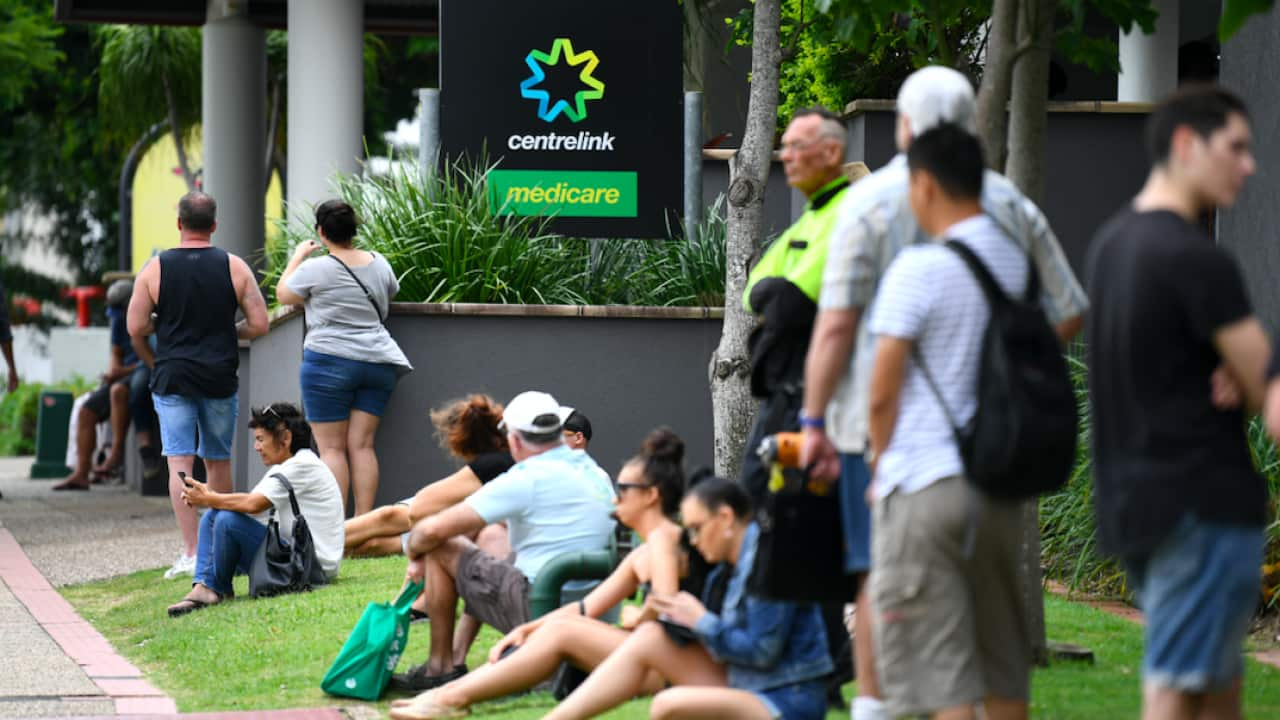University student Keila Carvalho took a break from her studies in Sydney when she travelled to Brazil on 5 March to surprise her father and uncle on their birthday.
The trip was meant to last only two weeks but she remains in the Brazilian city of Sao Paulo, staying in her nephew's bedroom, a long way from her partner Tom Bowen and their life together in Sydney.
The couple, who have been together for three years and lived in Sydney since 2018, have been apart for almost two months with Ms Carvalho unable to return to Australia since the borders were closed to non-citizens on 20 March to limit the spread of coronavirus. “I’m struggling here apart from my loved one - I can’t return home,” she told SBS News.
“I’m struggling here apart from my loved one - I can’t return home,” she told SBS News.

Keila and Tom. Source: Supplied
“My whole life is on hold at the moment waiting for the travel ban to be lifted."
Ms Carvalho was due to return on 21 March and despite a last-ditch effort to reschedule her flight, she was unable to get back earlier.
She said she has applied six times for an exemption on compassionate grounds but her pleas to return to her partner and studies have been denied.
"I didn’t imagine that they would close the borders and split up partners in this way," she said. In Sydney, her partner Tom, who is an Irish citizen, said he is struggling with the seclusion of life without her in their Chippendale apartment.
In Sydney, her partner Tom, who is an Irish citizen, said he is struggling with the seclusion of life without her in their Chippendale apartment.

Keila has applied for an exemption to return to her life in Australia. Source: Supplied
“The toughest part is not knowing when we’ll be together again and waking up everyday and not knowing when we’ll see each other again,” he said.
"We just want to be together - that’s the most important thing to us right now."
'Every one of these cases is difficult'
In a statement a spokesperson for the Department of Home Affairs said decisions to grant exemptions to the travel ban on compassionate grounds are made on a case-by-case basis against the health risks posed by international travellers.
"These decisions are not taken lightly, but the government’s priority is to protect the Australian community against the COVID-19 pandemic," the spokesperson said.
Several temporary visa holders have told SBS News that despite living in Australia and having partners here before the pandemic took hold, their applications have been denied. Earlier this month, Border Force Commissioner Michael Outram was pressed on the government's criteria for determining these exemptions at a Senate inquiry on COVID-19.
Earlier this month, Border Force Commissioner Michael Outram was pressed on the government's criteria for determining these exemptions at a Senate inquiry on COVID-19.

Border Force (ABF) Commissioner Michael Outram. Source: AAP
"There is no factor-weighted scoring model here; this is a very difficult task," he told the committee.
"I have to step back and balance the health advice ... with compassionate grounds for people to come."
Mr Outram said he had approved 1,170 such applications to enter Australia and refused 220 with "all of (his) reasons individually recorded".
"Every one of these cases is difficult, every one of them," he said.
"Each one of them I take very seriously and I have to balance those difficult judgements."
He has defended the process, saying the global pandemic had resulted in people who would "ordinarily" be able to enter the country being refused entry.
'I have no idea when I will see my husband'
Brazilian Bruna Barbosa is among those who have been unable to secure an exemption, meaning she is unable to return to her husband Elias, their home and dog in Orange, New South Wales.
She had travelled to Brazil on 9 March to undertake public health research for her work at an Australian university when she was caught out by the travel ban.
Ms Barbosa said she has applied eight times for an exemption on compassionate grounds without success. “I have no idea when I will see my husband … I just want to go to my house and to my life,” she told SBS News through tears.
“I have no idea when I will see my husband … I just want to go to my house and to my life,” she told SBS News through tears.

Bruna and Elias have also been separated by the coronavirus travel ban. Source: Supplied
“Why are they treating us like nothing? I love this country.”
The pair have lived in Australia since 2018 on a subclass 408 temporary activity visa, where Ms Barbosa's husband Elias also works as a mechanical engineer for a mining company.
Mr Barbosa said the couple were becoming frustrated by the uncertainty around when they would see each other again.
“What could be more compassionate than a couple that is married for seven years being apart,” he said.
“We can’t see any words from the government and from Border Force - no one is addressing us. We are still wondering when we will be together again.”
Calls for more transparency within review process
Temporary visa holders have complained that responses from the Department of Home Affairs to their applications seem automated and lack any information on why requests have been denied.
Migration Council Australia chief executive Carla Wilshire said that more transparency through the application process would go a long way towards easing the anxiety of applicants.
“It is really important that we make these processes as compassionate as possible and part of that is people understanding the rational and reasons why decisions are made,” she said.
“We certainly need to look at compassionate grounds particularly where close family units are separated and particularly where children are involved.”
The calls have been backed by the nation’s peak multicultural group FECCA who has also supported the push for more clarity and timely communication.
“This potential lack of communication may not help those people in this situation,” FECCA CEO Mohammad Al-Khafaji said.
“If people can demonstrate that they can support themselves fully while being in Australia then that should go towards improving their case.”
When will temporary visa holders be able to return?
According to the federal government’s roadmap towards easing restriction, stage three measures could include travel exemptions for international students being considered by July.
But temporary visa holders say they are desperate for more certainty over when they could be able to return to Australia, as couples face months apart.
Hungarian couple Amelia* and her husband say the distress of being separated as a result of the coronavirus travel bans is taking an emotional toll.
She has been stranded in Hungary since returning to attend a funeral in mid-March and was also unable to secure a flight home before the travel ban came into effect.
While overseas, the 28-year-old discovered she is pregnant for the first time.
“It’s been really hard on us - it’s really devastating sitting here and thinking about not being able to go home,” Amelia, who has requested her name be withheld because of the pregnancy, said.
The couple has lived together in Sydney for over a year with both working on temporary skilled shortage 482 visas.
They said their numerous applications for an exemption detailing their personal situation and including an offer from Amelia's employer to pay for the 14-day hotel quarantine if she returned, have been rejected.
"They don’t give us an answer of why they are rejecting - they just reject it," Amelia said.
"It is really tough - especially when it is our first ever pregnancy."
*Name has been changed





